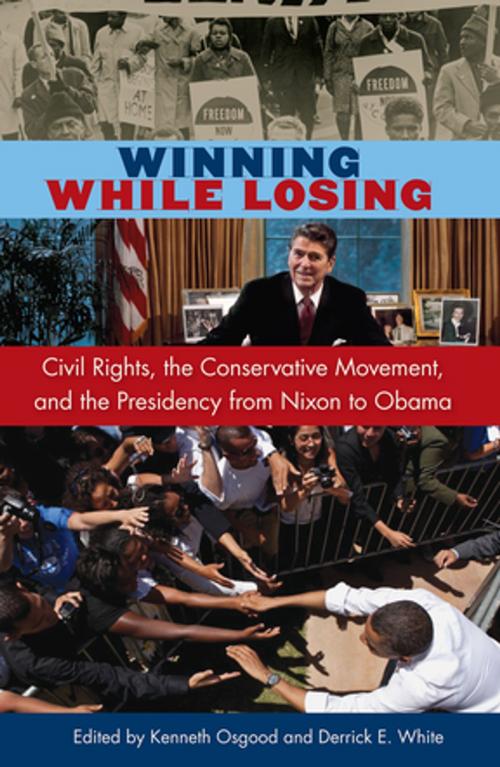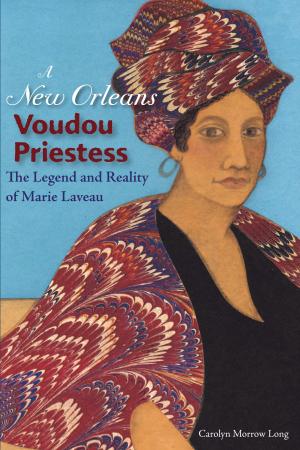Winning While Losing
Civil Rights, The Conservative Movement and the Presidency from Nixon to Obama
Nonfiction, Social & Cultural Studies, Political Science, Government, Elections, Politics, Civil Rights, History, Americas, United States| Author: | ISBN: | 9780813063331 | |
| Publisher: | University Press of Florida | Publication: | October 23, 2017 |
| Imprint: | University Press of Florida | Language: | English |
| Author: | |
| ISBN: | 9780813063331 |
| Publisher: | University Press of Florida |
| Publication: | October 23, 2017 |
| Imprint: | University Press of Florida |
| Language: | English |
"Explor[es] the paradoxical nature of racial politics in the post–civil rights period. . . . Does us the service of detailing how different presidential administrations handled civil rights, complicating our understanding of the major themes that defined the era."--American Historical Review "Adds depth to our historical understanding of how various presidents and their administrations approached issues pertaining to the equal rights of black (and to a lesser extent, Hispanic) Americans in a number of institutional and legislative arenas."--Journal of American History "Expertly link[s] executive decision-making and electoral strategizing with the politics of civil rights."--Journal of American Studies "Examines the forward and backward movement of civil rights since the resurgence of conservative politics in 1968. . . . Welcome and helpful."--Journal of Southern History "An invaluable addition to the rapidly developing historiography of neoconservativism, particularly the ideology’s relationship with African Americans."--Louisiana History "A striking example of a successful meshing of historical and political science methodologies and scholarship."--North Carolina Historical Review "This remarkable study offers breakthrough findings and insights about the state of civil rights policies in the post-civil rights era."--Hanes Walton Jr., coauthor of American Politics and the African American Quest for Universal Freedom "Eschewing easy absolutes, Winning While Losing presents a carefully nuanced interpretation of the subtle gains and losses experienced by liberals and conservatives, by Democrats and Republicans, and by proponents of racial justice and their opponents."--Harvard Sitkoff, author of Toward Freedom Land "Insightful and fascinating. Sets an agenda for further scholarly debate about the puzzle of 'winning while losing' that defines the fortunes of civil rights and the stratagems of politicians over the past generation."--Robert Mason, author of Richard Nixon and the Quest for a New Majority "A comprehensive account of the links between racism, conservatism, and presidential politics in the post-civil rights era."--Greta de Jong, author of Invisible Enemy: The African American Freedom Struggle after 1965 During the four decades separating the death of Martin Luther King and the election of Barack Obama, the meaning of civil rights became increasingly complex. Civil rights leaders made great strides in breaking down once-impermeable racial barriers, but they also suffered many political setbacks in their attempts to remedy centuries of discrimination. Complicating matters, the conservative turn in American political life transformed the national conversation about race and civil rights in surprising ways. This pioneering collection of essays explores the paradoxical nature of civil rights politics in the years following the 1960s civil rights movement by chronicling the ways in which presidential politics both advanced and constrained the quest for racial equality in the United States.
"Explor[es] the paradoxical nature of racial politics in the post–civil rights period. . . . Does us the service of detailing how different presidential administrations handled civil rights, complicating our understanding of the major themes that defined the era."--American Historical Review "Adds depth to our historical understanding of how various presidents and their administrations approached issues pertaining to the equal rights of black (and to a lesser extent, Hispanic) Americans in a number of institutional and legislative arenas."--Journal of American History "Expertly link[s] executive decision-making and electoral strategizing with the politics of civil rights."--Journal of American Studies "Examines the forward and backward movement of civil rights since the resurgence of conservative politics in 1968. . . . Welcome and helpful."--Journal of Southern History "An invaluable addition to the rapidly developing historiography of neoconservativism, particularly the ideology’s relationship with African Americans."--Louisiana History "A striking example of a successful meshing of historical and political science methodologies and scholarship."--North Carolina Historical Review "This remarkable study offers breakthrough findings and insights about the state of civil rights policies in the post-civil rights era."--Hanes Walton Jr., coauthor of American Politics and the African American Quest for Universal Freedom "Eschewing easy absolutes, Winning While Losing presents a carefully nuanced interpretation of the subtle gains and losses experienced by liberals and conservatives, by Democrats and Republicans, and by proponents of racial justice and their opponents."--Harvard Sitkoff, author of Toward Freedom Land "Insightful and fascinating. Sets an agenda for further scholarly debate about the puzzle of 'winning while losing' that defines the fortunes of civil rights and the stratagems of politicians over the past generation."--Robert Mason, author of Richard Nixon and the Quest for a New Majority "A comprehensive account of the links between racism, conservatism, and presidential politics in the post-civil rights era."--Greta de Jong, author of Invisible Enemy: The African American Freedom Struggle after 1965 During the four decades separating the death of Martin Luther King and the election of Barack Obama, the meaning of civil rights became increasingly complex. Civil rights leaders made great strides in breaking down once-impermeable racial barriers, but they also suffered many political setbacks in their attempts to remedy centuries of discrimination. Complicating matters, the conservative turn in American political life transformed the national conversation about race and civil rights in surprising ways. This pioneering collection of essays explores the paradoxical nature of civil rights politics in the years following the 1960s civil rights movement by chronicling the ways in which presidential politics both advanced and constrained the quest for racial equality in the United States.















